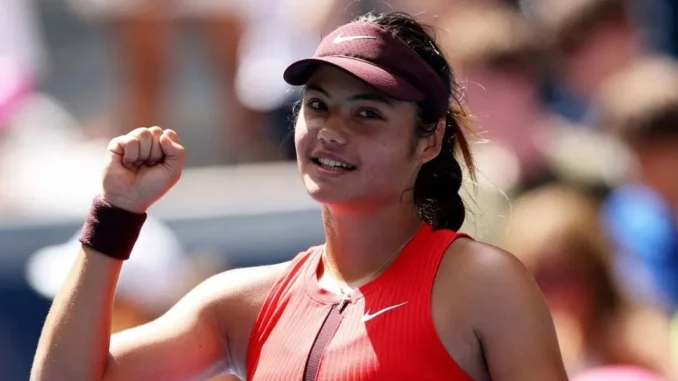
The tennis world is abuzz with controversy as Emma Raducanu, Britain’s 2021 US Open champion, faces scrutiny for her decision to withdraw from the 2025 Billie Jean King Cup Finals in Shenzhen, China, opting instead to compete in the WTA 500 Korea Open in Seoul. The move, which has drawn sharp criticism from some corners of the tennis community, particularly the Lawn Tennis Association (LTA), has been staunchly defended by her former coach, Mark Petchey. He argues that the relentless demands of the professional tennis schedule, not Raducanu’s commitment to her country, are to blame. As the 22-year-old prepares to face Jaqueline Cristian in Seoul’s first round, her choice underscores a pivotal moment in her career—one where personal ambition and long-term growth take precedence over national duty.
Raducanu’s withdrawal from the Billie Jean King Cup, where she was expected to lead Great Britain against Japan in the quarterfinals on September 18, sent shockwaves through the sport. Last year, she was a linchpin for Team GB, going unbeaten in her three singles matches to propel the squad to the semifinals in Malaga. Her absence this time, with Francesca Jones stepping in alongside Katie Boulter, Sonay Kartal, and Jodie Burrage, has been labeled a blow to Britain’s chances of securing their first-ever BJK Cup title. The LTA expressed their disappointment succinctly: “Of course we are disappointed. However, we believe we have a great team and we’re looking forward to competing in Shenzhen.” Yet, the decision has sparked a broader debate about the sport’s grueling calendar and the pressures it places on young stars like Raducanu.
Petchey, who coached Raducanu informally from March to August 2025 before handing the reins to Rafael Nadal’s former coach Francisco Roig, has been vocal in her defense. Speaking to a tennis betting platform, he dismissed criticism that questioned her patriotism. “There’s always two sides to everything. It’s very easy to come down on the side that you should want to represent your country,” Petchey said, pointing to Raducanu’s proven track record. “To be fair to Emma, when you look back at what she achieved on the clay against France, she proved that when she’s put up against it, she can A, produce the goods and B, does want to play. I don’t think you can blame Emma for a schedule that makes zero sense.” His comments highlight the chaotic timing of the BJK Cup, moved forward to September to align with the Asian swing but clashing with crucial WTA events like the Korea Open, where Raducanu is defending quarterfinal points from 2024.
Raducanu’s 2025 season has been a tale of resurgence. After battling injuries and inconsistency since her US Open triumph, she posted a 26–18 record this year, reaching the quarterfinals at the Miami Open and Queen’s Club Championships, and the semifinals at the Mubadala Citi DC Open. Her third-round run at the 2025 US Open, where she fell to Elena Rybakina, marked her best Flushing Meadows performance since 2021. Now ranked No. 34, Raducanu sees the Korea Open as a chance to climb closer to the top 30, securing a potential seeding at the 2026 Australian Open. “I’m just enjoying my tennis, for the most part,” she said after her US Open exit. “In the big scheme of things, I’m working towards playing better and being a more complete tennis player overall.”
Her decision to prioritize Seoul, where she accepted a wildcard, reflects a strategic focus on her partnership with Roig, who joined her team in August. Their collaboration, though in its early stages, has shown promise, with Raducanu refining her slice and building consistency. Petchey, reflecting on his time with her, noted the delicate balance of her choice: “For me, when I was with her and before Francisco took over the reins full-time, it was a 50-50 call in that regard.” He emphasized the importance of Seoul’s familiar conditions, where Raducanu reached the semifinals in 2022 and quarters in 2024, as a platform to regain momentum. “The tournament in Seoul is one that she obviously has played well at in the past,” he added. “Tennis players want to go back to environments that they feel good in.”
Critics, however, argue that Raducanu’s withdrawal undermines her commitment to British tennis, especially given her Chinese heritage and the event’s marketability in Shenzhen. This isn’t her first absence—she skipped the BJK Cup qualifiers in April to train with Petchey in Los Angeles, citing the need to “look after her body” after a stalker incident and a taxing schedule. Yet, Petchey and supporters see her choice as pragmatic, not disloyal. The International Tennis Federation’s scheduling, squeezing the BJK Cup between major WTA events, has drawn ire from players like Iga Swiatek and Amanda Anisimova, who also withdrew. Raducanu’s focus on Seoul, where she faces a tough draw including a potential quarterfinal against Swiatek, underscores her determination to prioritize long-term growth over short-term national glory.
As Raducanu steps onto Seoul’s hard courts, the spotlight will be on her ability to silence doubters with her performance. Her clash with Cristian promises to be a test of her evolving game against a player in top form. Win or lose, Raducanu’s decision reflects a young athlete navigating the high-stakes world of professional tennis, where every choice carries weight. Petchey’s defense resonates: in a sport with a “schedule that makes zero sense,” Raducanu is charting her own path, one dart at a time.
Leave a Reply